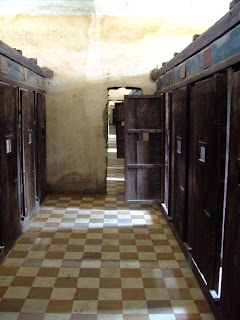Although I am not yet very far into
the reading of Into the Wild,
I did watch the film version last night and have plenty of initial
reactions. First, let me just recommend the film to anyone who
hasn't seen it. It is incredibly well crafted and performed; and in
the end, it poses more questions than it answers, which is something
I really like in a film. ($2.99 Amazon-on-Demand, rent it!)
Clearly,
the biggest question is whether to esteem McCandless for staying true
to his ideals, despite where they led, or to condemn him for
attempting a foolish and unreasonable existence. Both points of view
are based on a number of assumptions concerning the ways in which one
“ought” to live one's life, and I think that a case could be
justified for either opinion of McCandless.
I
can't help but think of Annie Dillard's “Living Like Weasels”
when I think of McCandless. The obvious connection between the two
individuals is the desire to be alone/at one with nature, but many of
the questions posed and ideas posited in “Living Like Weasels”
relate directly to McCandless' schema. Near the end of her essay,
Dillard describes her desired way of living in relation to that of
weasel as “choosing the given with a fierce and pointed will.”
The apparent contradiction of choosing a given to me seems to relate
directly to McCandless' choice of lifestlye. He held himself to a
rigorous moral code and conducted his journey with an inflexible
creed. He knew there were other approaches, yet to him there was
only one way to do it. Thus, he burned his cash, abandoned his car,
and stayed in one place only as long as he needed. His chosen way of
life was the given.
As Dillard writes and McCandless does, “I could very calmly go
wild.”
In
the penultimate paragraph of “Living Like Weasels,” Dillard
reflects, “The thing is to stalk your calling in a certain skilled
and supple way, to locate the most tender and live spot and plug into
that pulse. This is yielding, not fighting...yielding at every
moment to the perfect freedom of a single necessity.” To the folks
who regard McCandless as a reckless fool, he was fighting, fighting
the systematized way of life that they themselves take for granted as
the given. But to
McCandless, I think, and to those who sympathize with his cause (even
if we don't have the guts to do it ourselves), it is most definitely
a yielding. Once one recognizes the true course one is meant to
take, there is little to be done except be carried away by one's own
passion and involvement in seeking the fruition of that passion. Of
course, that passion isn't always the desire to be a “leather
tramp” or to make on one's own in the wilderness of the Yukon, but
I think that anyone who recognizes at what Dillard is pointing cannot
help but to feel some sympathy for McCandless.
That being said, the final paragraph of "Living Like Weasels" has a particular, chilling resonance with McCandless' fate, though somewhat different from the slightly indulgent connections I have drawn thus far. Remember the image of the weasel cleaved to the flying eagle from the beginning of Dillard's essay? Okay good, so I'm just going to leave with her ending now because I think it speaks for itself:
I
think it would be well, and proper, and obedient, and pure, to grasp
your one necessity and not let it go, to dangle from it limp wherever
it takes you. Then even death, where you're going no matter how you
live, cannot you part. Seize it and let it seize you up aloft even,
till your eyes burn out and drop; let your musky flesh fall off in
shreds, and let your very bones unhinge and scatter, loosened over
fields, over fields and woods, lightly, thoughtless, from any height
at all, from as high as eagles.













